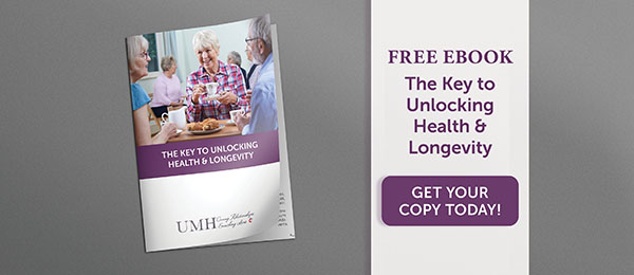Relationships & Aging Well: What the Experts Say About Human Connection
Independent Senior Living | senior living nutrition | dependent senior living | winter activities for seniors
Over the last 30+ years, the field of interpersonal neurobiology has emerged as a framework for studying the effects of relationships on the human mind and body. It’s an area focused on the fundamental role of human connection in our lives. Whereas important aspects of physical and mental health, like diet and exercise, have long been recognized as leading contributors to a long and healthy life, many researchers, scientists, and medical professionals are now acknowledging interpersonal relationships as an undeniable influence on living and aging well.
The rippling impact of the COVID pandemic over the last year is perhaps some of the most hard-hitting proof that an absence of human connection can severely threaten the human mind, body, and spirit. For seniors, a group that has been particularly affected by both the disease itself and the loneliness caused by social distancing measures, the experience of isolation has resulted in tremendous suffering and declining health.
So, what is it that makes connection so integral to human health, and why is interpersonal neurobiology becoming such an increasingly studied field? Following are some vital insights from experts who can explain this dynamic. They make the case for why a heightened focus on personal relationships is essential for seniors to live healthier, longer, and happier lives.
The Secret to Staying Young
“Of all the experiences we need to survive and thrive, it is the experience of relating to others that is the most meaningful and important,” says Louis Cozolino, professor of psychology at Pepperdine University, in his book Timeless: Nature’s Formula for Health and Longevity.
“As social animals, our brains are built through reciprocal interactions across the social synapse. Being a member of a complex society requires a brain equipped to process a vast amount of social information and adapt to a changing constellation of relationships. Nurturing, caretaking, and playing all trigger a symphony of processes that promote health and well-being. For humans, our relationships are our most important habitat.”
He goes on to explain that “as highly interdependent creatures with interdependent brains, it would make great sense that the health and longevity of our brains would be influenced by our active involvement in all our relationships.”
As seniors age, they often experience changes that impact their ability to cultivate and maintain healthy relationships with family, friends, and the community at large. But it is this very focus on human connection that is so crucial to “staying young,” or supporting physical and mental health throughout the aging process.
The Dangers of Solitary Living
In her book The Village Effect: Why Face-to-Face Contact Is Good for Our Health, Happiness, Learning, and Longevity, developmental psychologist Susan Pinker references the uptick in Americans living alone, noting that the rate has increased every decade since the early twentieth century. Seniors are a significant percentage of this population.
“While living alone doesn’t necessarily mean that you’re lonely,” she writes, “it does mean that like it or not, you have less physical proximity to other human beings whom you care about and who have an interest in your survival—fewer impromptu conversations, fewer shared puns and jokes, and, of course, less physical contact.” Essentially, “people who are solitary are deprived of the daily pats, hugs and eye contact that primates have been using to communicate for at least 60 million years.”
All of this has a dramatic impact on seniors’ physical, mental and emotional health. In fact, “without sustained social interaction, the human brain may become as impaired as one that has incurred a traumatic head injury,” explains Pinker. “If we don’t interact regularly with people face-to-face, the odds are we won’t live as long, remember information as well, or be as happy as we could have been.”
Social Activity as a Mind-Body Influencer
According to the National Institute on Aging (NIA), research links social isolation and loneliness to higher risks for certain physical and mental conditions. Some of these include:
- High blood pressure
- Heart disease
- Obesity
- A weakened immune system
- Anxiety
- Depression
- Cognitive decline
- Alzheimer’s disease
- Death
“People who find themselves unexpectedly alone due to the death of a spouse or partner, separation from friends or family, retirement, loss of mobility, and lack of transportation are at particular risk. Conversely, people who engage in meaningful, productive activities with others tend to live longer, boost their mood, and have a sense of purpose. These activities seem to help maintain their well-being and may improve their cognitive function, studies show.”
Bryan James, an epidemiologist at the Rush Alzheimer’s Disease Center in Chicago, studies the impact of greater social activity levels on health, and he reports that higher levels of social interaction can positively impact seniors. Specific studies throughout his efforts have revealed that someone with high levels of social activity has 43 percent less disability than someone who has low levels of social activity, and about half the rate of cognitive decline.
“When you use your brain and body the way it was intended—as it evolved—you age better,” says James. “We just aren’t meant to be disengaged from one another.”
The Fundamental Role of Community
When seniors find themselves living alone, feeling alone, or gravitating toward isolation, it is important for them to seek opportunities for human connection. For many, this might mean a lifestyle change. Senior living communities are an ideal solution to minimizing the effects of isolation, as they offer tangible benefits in the way of social interaction, day-to-day contact, opportunities for relationship-building, and a sense of safety among neighbors and staff.
As residents of senior living communities boost their engagement, interact with people more regularly, discover new interests and hobbies, share meals and activities, participate in the discussion and take advantage of various human touchpoints, they are better positioned to live healthier, longer, happier lives.
For information on how United Methodist Homes’ senior living community provides a wealth of offerings and opportunities to support the health and wellbeing of our residents, contact us today or schedule a complimentary visit now.
About Elizabeth Bemis
In 1998, I drove past an assisted living community construction site, learned that it was part of United Methodist Homes and realized the next stop on my professional journey was to work for a mission driven organization. Soon after, I joined the team as Executive Director of our Middlewoods of Farmington community and later served as Regional Manager for the Middlewoods properties before accepting my current role as Vice President of Marketing, Promotions, and Assisted Living Operations. I enjoy spending time with my family, cooking, reading, walking, and love working alongside our staff, residents, and families to build strong communities that reflect the mission, vision, and values of United Methodist Homes.

Our Blog is a 2016 Platinum Generations Award Winner! The Generations Award is an annual international competition for excellence in senior marketing recognizing professionals who have communicated to the 50+ Mature Markets.





